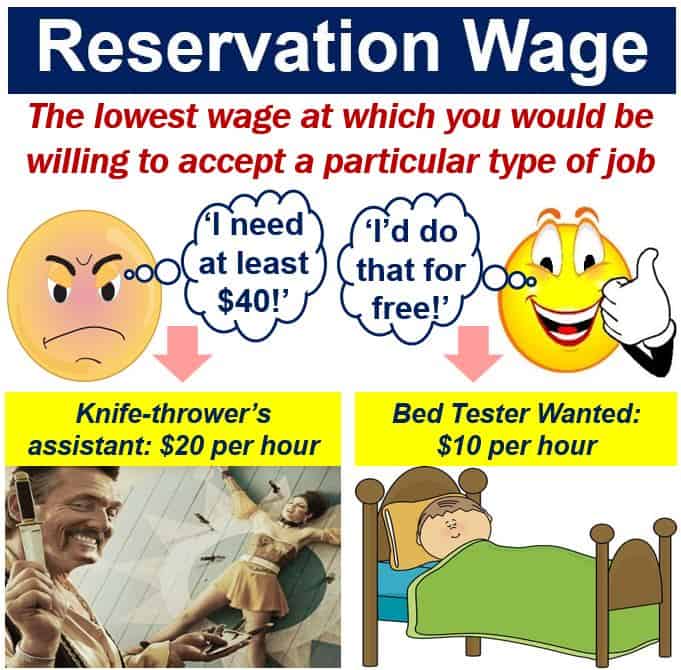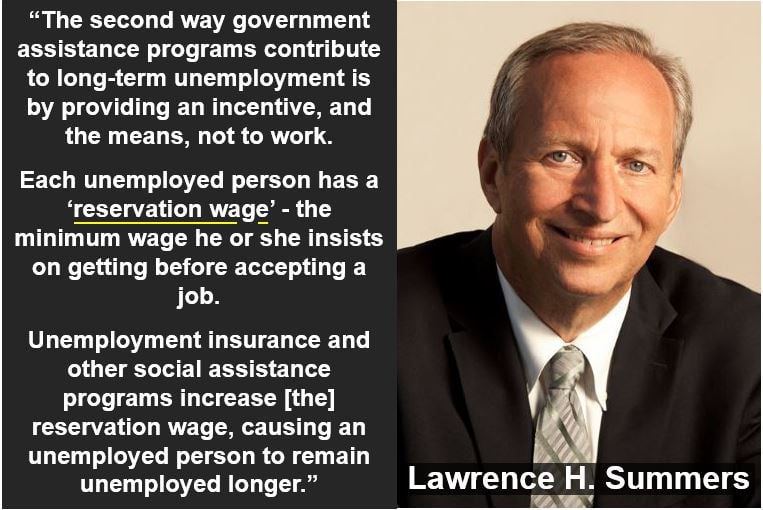What is reservation wage? Definition and meaning
Reservation wage refers to the least amount of money a person would consider working for in a particular position or type of employment. If you were looking for a job as a supermarket packer and your reservation wage was $8 per hour, it would mean that any packer’s position paying less than $8 per hour would be rejected by you.
Over time, our reservation wage might change, depending on a number of different factors. For example, changes in our living arrangements or marital status, whether or not we have dependent children, our overall wealth, our qualifications, how long we have been without a job, our general health, and whether we had developed any disabilities.
Young people with just a high school diploma will usually have a lower reservation wage than young university graduates.

Reservation wage – pleasant & unpleasant jobs
Most people tend to set a lower reservation wage when considering an offer for a pleasant job, and a higher one when it is an undesirable, dangerous or unpleasant one.
You might accept $8 per hour for a packer’s position, but would most likely insist on significantly more as a knife-thrower’s assistant in the circus, where you would have to stand against a wall while he or she threw knives that struck just a fraction of an inch from your body.
Some people may accept a low hourly wage for working in a computer shop of a national chain if they love computers, get employee discounts, can participate in training programs, and the store is down the road from where they live.
However, they would have a higher reservation wage if they had to work standing in the street carrying an advert all day – because working with computers is nicer for them than standing in the street all the time.
Reservation wage is for employees what reservation price is for consumers. Our reservation price is the highest price we are willing to pay for a particular good or service.
 The reservation wage of a skilled professional, such as an airline pilot, is considerably higher than that of an unskilled worker.
The reservation wage of a skilled professional, such as an airline pilot, is considerably higher than that of an unskilled worker.
“A reservation wage is the lowest wage which someone will accept for a job. The determination of reservation wage depends on the individual and the given job, and it can make up an important component of the job search.”
“Many people sit down to determine the lowest wage they can take when they start looking for a job, so that they can use this when evaluating job opportunities and job offers.”
Reservation wage models & graphs
When creating a model involving possible labor force participation, the reservation wage is the lowest rate for which an agent (job-seeker) will accept a job.
In a graph, the figure must be greater than zero, because the agent’s alternative to accepting that job has a positive value.
The alternative may be studying for a degree, having free time, taking care of children instead of paying for them to be looked after.
In rare cases, the alternative may have a negative value – a judge in court may give a person two option; either go to prison or get a job.
 Lawrence Henry ‘Larry’ Summers is an American economist, President Emeritus and Charles W. Eliot University Professor at Harvard University. He served as President of Harvard University from 2001 to 2006, and was Secretary to the Treasury under President Bill Clinton from 1999 to 2001. (Image: Wikipedia)
Lawrence Henry ‘Larry’ Summers is an American economist, President Emeritus and Charles W. Eliot University Professor at Harvard University. He served as President of Harvard University from 2001 to 2006, and was Secretary to the Treasury under President Bill Clinton from 1999 to 2001. (Image: Wikipedia)
Reservation wage and health
The notion of reservation wage has played a major role in labor market theory; especially in models for job-seeking, labor supply, and labor market participation.
Most studies have disagreed on the importance of health as a determinant for people’s desire to seek employment, what type of jobs they look for, and their reservation wage.
In an article published by White Rose Research in 2008 – ‘Reservation Wages, Labor Market Participation and Health’ – Sarah Brown, Jenny Roberts and Karl Taylor, all from Sheffield University in England, wrote the following regarding a study:
“Our results suggest that health is an important determinant of selection, both into economic activity and into employment (versus unemployment) but that, once these participation effects are accounted for, health is not a significant determinant of either the reservation wage or the market wage.”
“This casts doubt on the results of a number of previous studies that have failed to appropriately account for selection in models of male wages. Our results have important policy implications since they suggest that poor health is a major cause of economic inactivity.”
People with poor health are generally expected to have a higher reservation wage.
The study carried out by Brown, Roberts and Taylor found that the main role of poor health, however, was to weaken labor force attachment for individuals in the labor market – including both those currently employed or unemployed individuals – while “excellent self-assessed health has a positive effect on the probability of employment (versus unemployment), the health effects on the wages of both groups are insignificant.”
Reservation wage and unemployment
According to an article published by the US National Bureau of Economic Research in 2014 – ‘A Contribution to the Empirics of Reservation Wages’ – Alan B. Krueger, from Princeton University, and Andreas I. Mueller, from Columbia Business School, wrote that reservation wages appear to be of some consequence regarding unemployed people’s likelihood of getting back into work.
After gathering and analyzing data on self-reported reservation wages of over six thousand unemployment insurance recipients in New Jersey in the USA, Mueller and Krueger found that people are twenty-four percentage points more likely to accept a job offer that is at least equal to their reservation wage, compared to one that is below it.
People’s reservation wage goes down at a modest rate while they are unemployed – surprisingly more slowly than most people would expect. The authors found the decline ranged from 0.05% to 0.14% per week.
After being unemployed for twelve months, the participants’ reservation wage was ranged from 2.5% to 7% lower than it was at the beginning of their unemployment period.
The minimum acceptable pay threshold declined the fastest among people 51+ years. Older people plan to spend less time in the labor market, and tend to have more savings compared to their younger counterparts.
The researchers found no evidence of a downward trend in reservation wages for people who relied exclusively on unemployment insurance benefits for income support, even when they were close to the expiry date of those benefits.
Mueller and Krueger added:
“The results suggest that a sizable proportion of individuals are reluctant to reduce their reservation wage despite extended spells of unemployment. Relative to a calibrated job search model, the reservation wage of unemployed workers starts out too high and declines too slowly.”
“This is consistent with many workers persistently misjudging their prospects, and with reservation wages “anchored” on previous wages.”
Video – Deriving the reservation wage
In this Labor Economics video, the speaker uses a graph to explain how she derives the reservation wage.

